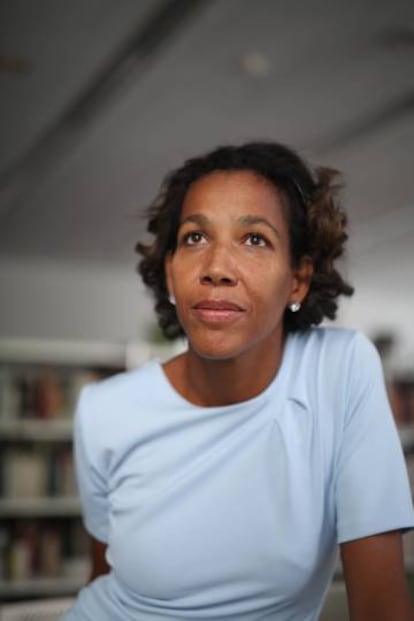“The relatives of many Nazis have no identity that is not tied to their family”
The granddaughter of concentration camp commander Amon Göth explains the shock of discovering her origins

Any genealogical tree can have unpleasant surprises. In the case of Jennifer Teege from Munich the surprise, which was discovered at random at a public library in Hamburg in 2008, became the difficult trauma that she exposes in My Grandfather Would Have Shot Me, a book that she published in Germany in 2013 and that now is being released in Spanish.

Her grandfather, the one who would not have tolerated her mixed-race origins, was Amon Göth, the Nazi commander of the Plaszow concentration camp in Krakow. He’s probably best known thanks to Ralph Fiennes’ depiction of him in the Steven Spielberg Holocaust movie Schindler’s List, which portrayed his sadistic customs, including shooting camp prisoners from his balcony and flogging Jewish servants.
“Genetic guilt does not exist,” says Teege. “My only responsibility as a German is to not shut up. I have fought a toxic secret.”
Written with the journalist Nikola Sellmair, the book switches between the first-person voice of the granddaughter and the third-person voice of the reporter. “It needed distance and the inclusion of other voices. It was a way to focus on my own journey without leaving out the rest of the story,” she says.
Genetic guilt does not exist. My only responsibility as a German is to not shut up Jennifer Teege, granddaughter of Nazi leader
Teege’s story is that of Monika Göth, her biological mother and sole daughter of the Nazi commander, and that of her grandmother Irene, who ended up committing suicide in 1983. When her mother was born, the Nazi officer was in prison. Under his command, at least 8,000 prisoners were killed and another 80,000, mostly Jewish men, women and children, were sent to the gas chambers of Auschwitz. In 1946, a year after the birth of his daughter, he was sentenced to death and hanged.
When Monika was six months old and her mother was walking her in a stroller, a man stabbed the baby in the neck. She was saved by a miracle. “You father is a subject of your life, something that constitutes your identity. Something that has occupied me so much that perhaps I did not have space for other people, for the role of mother, for me,” Teege writes in the book.
Teege is the fruit of her mother’s affair with a young Nigerian. “No, she wasn’t trying to prove anything,” Teege says of the mixed-race relationship. “It was a true love story that didn’t last long.” Her mother handed her over to a children’s home and then to a foster family, given her inability to care for her. Since then, they have maintained a tortuous and intermittent relationship, one that has led Tegee to seek years of therapy for depression.
When Spielberg premiered Schindler’s List, Göth’s persona became famous the world over. Monika Göth helped produce a book and a documentary about her father. It was that book that Teege discovered years later in a library in Hamburg. “My mother has not spoken to me in a while,” explains Teege. “She has decided that it is going to be this way and I can’t do anything. I could not say that I have forgiven her, but over time I have learned to empathize with her. Our relationship is very complicated. Isn’t it always with a mother?” she asks.
I have protected my children so that they know the truth without hurting them Jennifer Teege, granddaughter of Nazi leader
“Each person’s story is different, but the truth is that the relatives of many of the Nazis have grown up with a difficult burden to carry and without the opportunity to build an identity that is not tied to their family,” she adds.
She touches on the stories of Bettina Göring, granddaughter of Hermann Göring, who had herself sterilized, or of Niklas Frank, son of Hans Frank, the governor general of Nazi-occupied Poland and one of the war criminals executed after the Nuremberg Trials, who wallows in guilt as he carries the photograph of his father’s corpse broken by the gallows in his wallet. For Teege, who has two children and a lives a well-off life as a publicist in Hamburg, the problem is not the past, but the silence: “I have been transparent and careful with my children,” she explains. “I have protected them so that they know the truth without hurting them and when they are adults they can decide for themselves what to do with it.”
Germany, she says, is an exemplary country when it comes to handling historical memory, despite the outcome of Sunday’s election, whose results will allow a far-right party to enter parliament for the first time since World War II. In her opinion, the problem is the refusal to want to “learn” from that memory: “It is a global problem that politics has taken an emotional turn that is dangerous.”
Teege is a serene and somewhat serious woman whose face only lights up when she’s asked about her biological father, a tall and handsome man. “I reunited with him a year ago, and I traveled to Nigeria with his wife and children. It was fascinating to get to know my African roots and to leave aside my mother’s family for once.”
English version by Debora Almeida.
Tu suscripción se está usando en otro dispositivo
¿Quieres añadir otro usuario a tu suscripción?
Si continúas leyendo en este dispositivo, no se podrá leer en el otro.
FlechaTu suscripción se está usando en otro dispositivo y solo puedes acceder a EL PAÍS desde un dispositivo a la vez.
Si quieres compartir tu cuenta, cambia tu suscripción a la modalidad Premium, así podrás añadir otro usuario. Cada uno accederá con su propia cuenta de email, lo que os permitirá personalizar vuestra experiencia en EL PAÍS.
¿Tienes una suscripción de empresa? Accede aquí para contratar más cuentas.
En el caso de no saber quién está usando tu cuenta, te recomendamos cambiar tu contraseña aquí.
Si decides continuar compartiendo tu cuenta, este mensaje se mostrará en tu dispositivo y en el de la otra persona que está usando tu cuenta de forma indefinida, afectando a tu experiencia de lectura. Puedes consultar aquí los términos y condiciones de la suscripción digital.








































